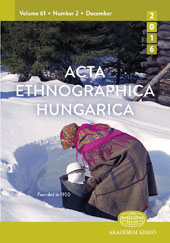Fasting in the Life of Russians 19th-20th Centuries
Fasting in the Life of Russians 19th-20th Centuries
Author(s): Tatjana VoroninaSubject(s): Cultural history, Recent History (1900 till today), Cultural Anthropology / Ethnology, 19th Century, Eastern Orthodoxy, History of Religion
Published by: Akadémiai Kiadó
Keywords: religion; Russian Orthodox Church; food; fasting; moral aspects;
Summary/Abstract: In the 19th century the traditional diet of the Russians was a wholesome and stable complex of nutrition which included fast days set apart for partial or complete abstinence from food during a calendar year. Fast days were set by the regulations of the Orthodox Church and were linked with the major Christian feasts, church events and remembrance days of the Saints. In practice all days of the year were divided into the days of abstinence from meat and dairy products when vegetable food only was allowed (govenije – “fasting”), and the days when their use was not restricted (mjasoed – “time when it is allowed to eat meat”). To give a clear idea of the place fasting occupied in the life of the people it is enough to say that more than 200 out of the 365 calendar days, i.e., the greater part of the year, were set apart as fasting periods of one or many days. The food taken on fast days had both some general and locally specific features. The urban diet differed from the rural; festive food had its specifics compared to the daily diet; the nutrition of wealthy peasants was more diverse than that of the poor. The importance of fast days lay not only in their restricting the diet to certain sets of food products, they served also to consolidate the norms of morality, to foster positive qualities and the like. Fasting habits and customs were passed down from one generation to the next, and thus carried a great educational content. It is important to compare the practice of fasting in the 20th century during the atheistic propaganda and after 1988, the year of the millennium of Christianity in Russia. Thus the fasts can reveal the characteristics of the religious mood of Russian society in the past and the present. Thanks to a considerable mass of archival and field materials, as well as published sources, it is possible to demonstrate the great role of fast days in the life of the Russian people.
Journal: Acta Ethnographica Hungarica
- Issue Year: 51/2006
- Issue No: 3-4
- Page Range: 235-255
- Page Count: 21
- Language: English
- Content File-PDF

